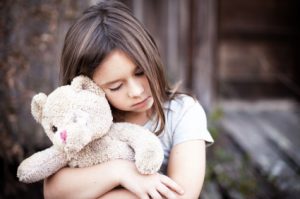Children and Grief

Director of Bereavement Services, Calvary Hospital
Experiencing the death of someone significant in your life can feel quite disorienting at any age. When this happens in childhood, grief needs can be very different from that of adults.
Bereavement in Children
In childhood, developmental understanding and coping styles within the family play a role in the child’s grief process, among other things such as culture and religion. Children of different ages have different styles of adapting and different abilities to understand abstract concepts like religion and death. Remaining concrete in your language around death will help children to begin the process of understanding.
Children are often left out of important details and rituals because the adults around them are consumed with their own pain or at a loss about how to address the children in a helpful way. This makes sense, none of us are handed a manual that guides us through the painful process of grief, let alone one that helps us figure out how to help a child through it.
 It’s important to understand that first and foremost, children need to develop a vocabulary for their feelings, which will then help them learn how to handle those feelings in ways that help and not hurt them. For example, children need to know that it is okay to feel anger, frustration and sadness at any time after they have suffered the death of someone close to them. They need to know that when they feel this way, that there are people they can go to for comfort.
It’s important to understand that first and foremost, children need to develop a vocabulary for their feelings, which will then help them learn how to handle those feelings in ways that help and not hurt them. For example, children need to know that it is okay to feel anger, frustration and sadness at any time after they have suffered the death of someone close to them. They need to know that when they feel this way, that there are people they can go to for comfort.
As you help a child you love to express themselves in their grief, you may find it helpful to seek out a trusted person such as a religious leader or counselor, to help guide you.
Parents or guardians often feel confused when faced with different reactions from their grieving children. Some parents worry their child is indifferent to death while others think their child is too emotional about it. Each child is an individual and will handle grief differently. However their children react, parents should not criticize them nor suggest that they act differently.
It’s not uncommon for younger children to ask you several times about the circumstances surrounding the death. This is generally to process what happened and to make sure the story has not changed.
 Key Issues with Grieving ChildrenChildren tend to worry about who will care for them if their other guardian dies; this is not because they don’t care about the person who died but because they are thinking about how they will get their own needs met in a world where they have to rely on the adults around them for that. They will process what they can at their age and feel different parts of their grief as they grow and change developmentally.
Key Issues with Grieving ChildrenChildren tend to worry about who will care for them if their other guardian dies; this is not because they don’t care about the person who died but because they are thinking about how they will get their own needs met in a world where they have to rely on the adults around them for that. They will process what they can at their age and feel different parts of their grief as they grow and change developmentally.
For instance, it can be quite natural for a 17-year-old to experience a renewed intensity of their grief as they approach high school graduation, after having worked through some painful grief at age 10, when they experienced their loss initially.
Children will take their lead from the adults around them about how to handle death. Find ways children can help the family during this time and be a part of mourning rituals so they too can feel supported through this. Inviting children to assist with a picture collage, help to organize a family event or preparing a special meal, can really help them feel included. There is great comfort in grieving with the rest of your family.
Grief can be a very isolating experience for children in school. They may not want to discuss the death because they don’t want to be viewed as different from their peers, which makes it all the more important that they can discuss the death at home with their family.”
The Value of Bereavement Support Groups

Allowing children to participate in a bereavement group offers them the opportunity to connect with other children their age who understand. Bereavement support for children has a special focus in creative arts activities to help children express themselves using a language that is fun and engaging for them. They learn what different words like grief mean and share ideas about how to cope and how to remember their special person who died.
Closing Thoughts
Part of our role as adults is to help children learn about the realities of life and how to navigate them. Teaching children about death and helping them through their grief process teaches them how to handle future losses. Normalizing this experience helps them see that they can grieve and also still go on participating in life.
Learn more about Calvary’s bereavement support program:
Childrens Bereavement Support/
OR
Adult Bereavement Support/
Categories
Archives
- June 2025
- May 2025
- April 2025
- March 2025
- February 2025
- October 2024
- August 2024
- July 2024
- May 2024
- April 2024
- March 2024
- February 2024
- December 2023
- November 2023
- October 2023
- August 2023
- July 2023
- June 2023
- May 2023
- April 2023
- March 2023
- January 2023
- December 2022
- October 2022
- August 2022
- July 2022
- June 2022
- April 2022
- March 2022
- February 2022
- January 2022
- October 2021
- September 2021
- August 2021
- July 2021
- June 2021
- May 2021
- April 2021
- March 2021
- February 2021
- December 2020
- November 2020
- October 2020
- September 2020
- August 2020
- July 2020
- May 2020
- April 2020
- March 2020
- February 2020
- January 2020
- December 2019
- November 2019
- October 2019
- September 2019
- August 2019
- July 2019
- May 2019
- April 2019
- March 2019
- February 2019
- January 2019
- December 2018
- November 2018
- October 2018
- September 2018
- August 2018
- July 2018
- June 2018
- May 2018
- April 2018
- December 2017
- November 2017
- October 2017
- September 2017
- August 2017
- July 2017
- June 2017
- May 2017
- April 2017
- April 2012

